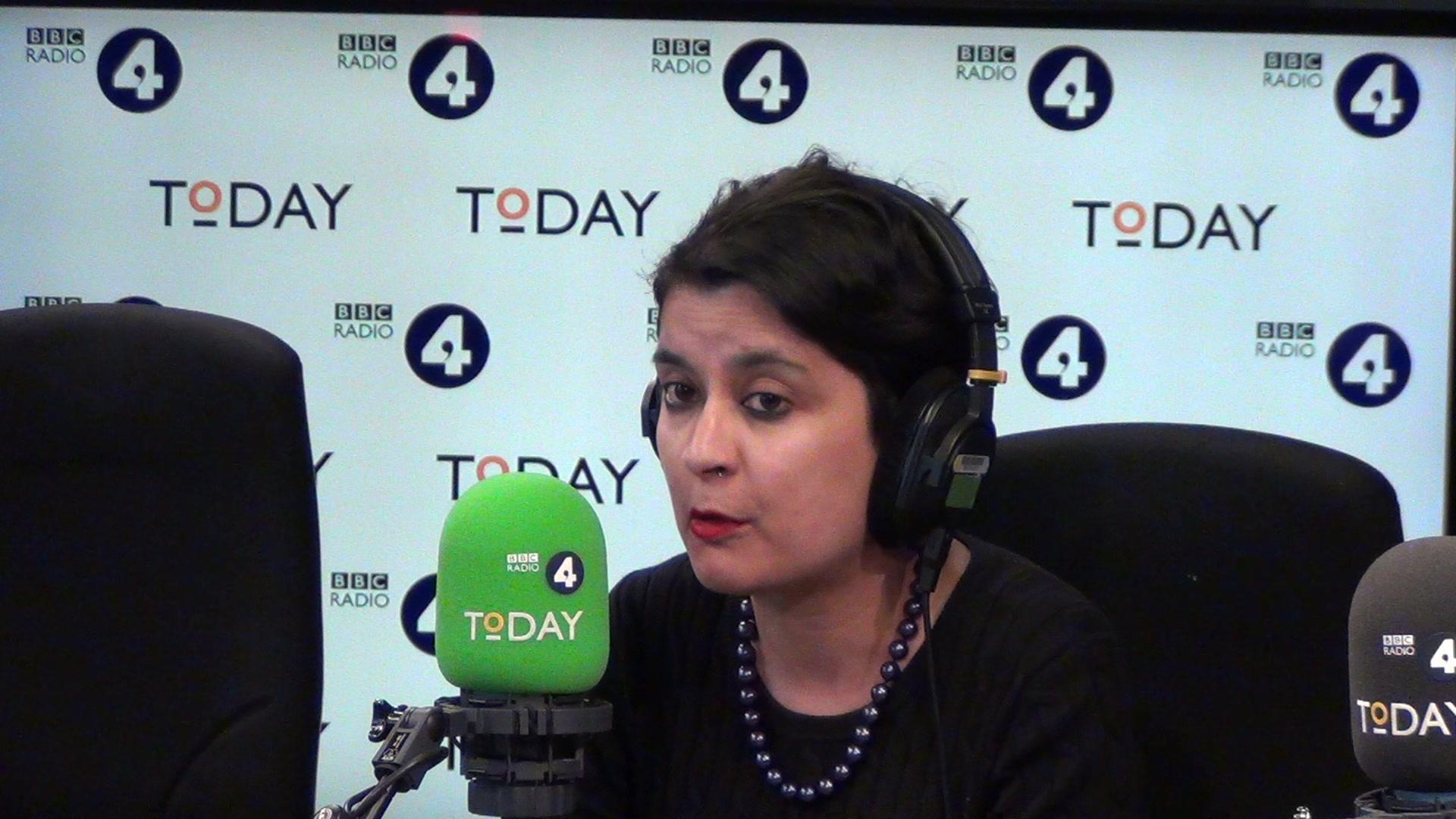Anti-Semitism row: Labour MPs applauded after Commons speeches
- Published
MPs given standing ovations after anti-Semitism speeches
Two Labour MPs have been given standing ovations in the Commons after speaking passionately about their own experience of anti-Semitic threats.
Luciana Berger said she had contended with abuse for 18 years after receiving her first piece of hate mail aged 19.
She told her party it had a "duty to the next generation" to confront the issue as "denial was not an option".
Ruth Smeeth said British Jews had a right to participate in public life as equals and would not be "bullied".
Addressing those who she said had dismissed claims of anti-Semitism as political smears, she said "we know what anti-Semitism is, we know where it leads, how dare these people suggest that".
During the parliamentary debate on anti-Semitism, a succession of MPs urged Jeremy Corbyn to act against offenders within the party.
Labour's communities spokesman Andrew Gwynne said "much more work needs to be done" on anti-Semitism, adding: "No political party has the monopoly on vice or virtue but we will put our house in order."
Repeating some of the insults and insinuations she had received firstly as a student activist and then MP for Liverpool Wavertree, Ms Berger said she said had been vilified as "paid-up Israeli operative", a traitor, an "absolute parasite", and told to "get out of the country and go back to Israel".
'Time for action'
She said she had received abuse from both the far-left and far-right of politics, and that the abuse had become more "commonplace and corrosive" in the past two years.
Her own party, she said, "urgently needs to address this issue publicly and consistently".
"We have a duty to the next generation. Denial is not an option. Prevarication is not an option. Being a bystander who turns the other way is not an option. The time for action is now. Enough really is enough."
The Labour leader, who was present in the chamber for much of the debate, is due to hold talks next week with leading Jewish groups amid criticism of his handling of anti-Semitism cases.
Corbyn urged to 'boot out' Livingstone from Labour
Labour has been accused of not fully implementing the recommendations of a 2016 review into anti-Semitism and other forms of racism in the party.
The inquiry found that although the party was "not over-run" by anti-Semitism, there was an "occasionally toxic atmosphere" within the party which needed to be addressed.
A number of MPs called for the expulsion of former London Mayor Ken Livingstone, who has been suspended since 2016 for comments he made about Adolf Hitler and Zionism. Backbench Labour MP Ian Austin called for Mr Livingstone to be "booted out" immediately.
Mr Livingstone, London mayor between 2000 and 2008, has been suspended indefinitely pending the outcome of an internal investigation over his claim that Adolf Hitler supported Zionism in the 1930s. An internal disciplinary panel upheld three charges against Mr Livingstone of breaching party rules in April 2017.
'Disgrace'
Mr Austin said there had been "ample time" for a decision on the future of the ex-London mayor, who has insisted his comments were historically accurate and will not apologise.
Mr Austin said that no action had been taken despite the condemnation of the Community Security Trust, the Holocaust Educational Trust, the Jewish Labour Movement and the chief rabbi.
"Still nothing has happened, it is a disgrace," he said.
"Let's be clear about this. Ken Livingstone claiming Hitler was a Zionist is anti-Semitism pure and simple. It happened two years ago, there has been ample time to deal with it. It is a disgrace it has not been dealt with. Kick him out immediately... Boot him out.
Mr Gwynne said due process must be observed but the case was taking too long to resolve. Describing Mr Livingstone's comments as "abhorrent", he said there must be "zero tolerance" of anti-Semitism within Labour and the left as a whole.
"We need to be better at policing our borders," he told MPs. "We need not just to call it out but to cut it out."
'Pernicious'
Earlier in the debate, Communities Secretary Sajid Javid warned the "world's oldest hatred" was on the rise in the UK and worldwide and that it was up to MPs from all parties to show they "get" the "pernicious prejudice" of anti-Semitism.
He criticised what he described as "dinner party anti-Semites" who were on the surface "self-respecting and respectable" but who freely repeated old anti-Semitic "tropes".
He also said tech giants needed to do more to remove anti-Semitic material from their platforms, promising "no hiding place" from the authorities for those spreading vile abuse online.
Ahead of Tuesday's debate, the Board of Deputies president Jonathan Arkush warned that anti-Semitism should be "called for what it is - anti-Jewish racism".
He warned it had "sadly and shamefully" re-emerged to "infect parts of British political life".
- Published16 April 2018
